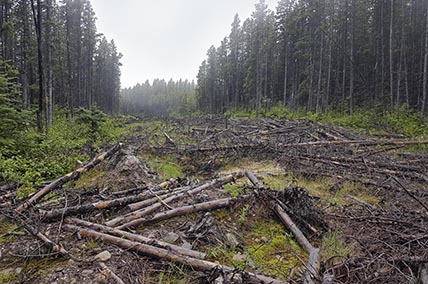Deep learning for Caribou habitat disturbance mapping
Nov 12, 2020
Hatfield’s new research project applies deep learning to identify linear disturbances in Woodland Caribou ranges across Canada.
The Woodland Caribou (Rangifer tarandus caribou) (Southern Mountain population) is designated as Threatened by the Committee on the Status of Endangered Wildlife in Canada (COSEWIC). Local herds in the Southern Mountain population are generally small, increasingly isolated, and threatened by decreasing habitat quantity and quality, disturbance, and predation¹.
Existing methods to map linear disturbances are not cost-effective at covering large areas, which has resulted in incomplete disturbance information to support decision-making across Canada. On the one hand, visual interpretation of disturbance using very high to medium resolution images is very accurate, but expensive and time consuming at covering large areas. Visual interpretation of free medium resolution data, such as Landsat (15 to 30m pixel size), is known to miss many narrow features that are not visible in the images. On the other hand, automated methods using standard image analysis or machine learning methods (such as Random Forest) can cover large areas, but high resolution satellite images or lidar data are expensive for large areas. Using medium resolution data will fail to capture the narrower linear disturbances and result in a large amount of omission errors. The need for advanced methods to map linear disturbance accurately across large areas is ubiquitous in Canada and elsewhere.
Recent advancements in deep learning algorithms and cloud computing represent an opportunity to bridge the gap in accuracy between methods using visual interpretation and those relying on machine learning, in order to make them operational to support decision making. Deep learning algorithms represent an opportunity for accurate linear disturbance mapping since they explicitly account for the spatial context and can deal with much complex interactions between variables than traditional machine learning methods. Deep learning methods are computationally intensive, meaning that they need to be coupled with cloud computing resources and run on GPUs to enable scalability across large areas.
Hatfield’s “Evaluating Earth Observation Data and Deep Learning for Landscape Disturbance Mapping” (EO-DL4DM) project will investigate deep learning techniques using a range of high- and medium-resolution EO data, such as Landsat, Sentinel-2, SPOT, and PlanetScope.
These deep learning techniques will be tested for scalability using the GEO Analytics Canada big data geoscience platform – a cloud-based platform hosted in the public cloud that enables full-scalability through cluster computing using Kubernetes/Docker and enables GPU processing.
The EO-DL4DM project will produce a proof of concept in the use of deep learning to detect and extract a contemporary disturbance data set across study sites in northeastern BC and northwestern Ontario. The outputs from such a system can inform:
- Practitioners planning habitat restoration
- Organizations identifying areas for enhancing carbon sequestration
- Geospatial scientists on the trade-off between image spatial resolution and detectability of linear features
- Cloud developers seeking to understand the feasibility of scaling algorithms across massive areas.
Deliverables from the project will be novel and innovative algorithms and the intellectual knowledge required to operationalize this solution.
The research is supported by the Canadian Space Agency (CSA) smartEarth – Enabler Track – and will be completed with inputs from federal and provincial scientists. The EO-DL4DM project will enhance the competitiveness of the Canadian Earth observation industry through innovative research in deep learning and improve uptake of Earth observation solutions by capitalizing on these advanced analyses.
Photo credit: SERNbc
¹Recovery Strategy for the Woodland Caribou, Southern Mountain population (Rangifer tarandus caribou) in Canada
For more information, please contact:
Dr. Andy Dean
Senior Partner
HATFIELD CONSULTANTS PARTNERSHIP
E-mail: hcp@hatfieldgroup.com
Tel.: +1-604–926-3261
Toll-Free: +1-866-926-3261
